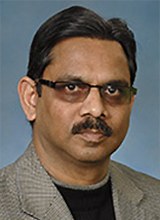Neeraj Saxena, Ph.D.
Program Officer
|
Early Detection
Email: neeraj.saxena@nih.gov
Phone: 240-276-6302
Room: 5E218

Biography
Neeraj Kumar Saxena, Ph.D., serves as a Program Director in the Early Detection Research Group (EDRG), Division of Cancer Prevention (DCP), National Cancer Institute (NCI).
Dr. Saxena oversees the Etiologic and Early Marker Studies (EEMS) Program within the Prostate, Lung, Colorectal, and Ovarian (PLCO) Cancer Screening Trial. He provides scientific leadership and strategic direction to advance early cancer detection efforts, ensuring the efficient and judicious use of PLCO trial biospecimens both in the United States and internationally. Dr. Saxena also manages and coordinates a grant portfolio focused on early detection of various cancers.
Dr. Saxena received both a M.Sc. and Ph.D. from the University of Delhi, India. Before joining NCI, he held academic and research positions including tenure-track faculty positions at the Emory University and University of Maryland. Over a career spanning more than 17 years, he has developed expertise in basic, preclinical, and translational research, with a primary focus on oncology, gastroenterology, and hepatology.
Dr. Saxena has secured multiple research grants from prestigious organizations, including the NIH, the Department of Defense, and private foundations. His scientific contributions are reflected in more than 50 peer-reviewed publications in top-tier journals such as Gastroenterology, Hepatology, and Cancer Research. Beyond his research, he is a dedicated mentor, having guided numerous graduate students and postdoctoral fellows, many of whom have gone on to prominent roles in academia and research.
In addition to his mentorship, Dr. Saxena has actively contributed as a scientific and manuscript reviewer for leading journals and has served as a grant reviewer for major funding agencies, including the Department of Defense's Congressionally Directed Medical Research Programs. He has played a significant role in national and international scientific conferences, chairing sessions and presenting research findings. In addition, his involvement on the editorial boards of multiple journals underscores his commitment to advancing scientific knowledge and fostering collaboration in the research community.
